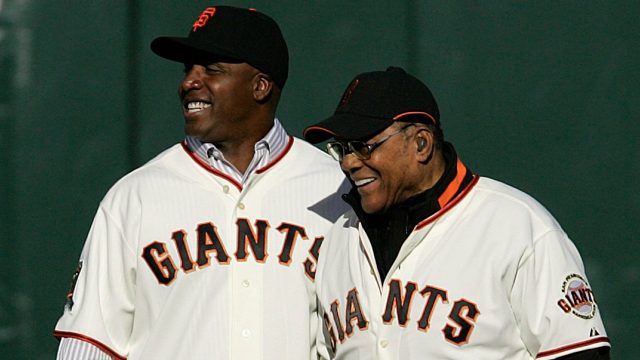
BIRMINGHAM, Ala. — As Ajay Stone strolled around historic Rickwood Field and gazed at tributes displayed in honor of Willie Mays and other Negro Leaguers, he clutched a cherished memory under his arm.
It was a picture from 2004 of Mays holding Stone’s then-10-month-old daughter Haley, who was wearing San Francisco Giants gear. In Mays’ hand was a chunk of a chocolate chip cookie, which he was handing over for Haley to eat.
“Willie gave her that cookie. She had no teeth,” Stone remembered. “But we took the cookie and we kept it in her stroller for a year and a half. The great Willie Mays gave it to her, so it was special to us.”
Stone and his wife Christina traveled from Charlotte, North Carolina, to be in Birmingham, Alabama, on Thursday for a moment they deemed just as special.
It was hours before Rickwood Field hosted its first Major League Baseball game between the Giants and St. Louis Cardinals. The game, which MLB called “A Tribute to the Negro Leagues,” was meant to honor the legacy of Mays and other Black baseball greats who left an enduring mark on the sport.
MLB planned a week of activities around Mays and the Negro Leagues, including an unveiling ceremony on Wednesday of a Willie Mays mural in downtown Birmingham. Those tributes took on a more significant meaning Tuesday afternoon when Mays died at 93. As news of his death spread throughout Birmingham, celebrations of his life ramped up.
You could hear the celebration at Rickwood Field on Thursday even before arriving at the ballpark with the rapid thumping of a drum echoing from inside the ballpark, excited murmurs from fans skipping toward the music and frequent bursts of laughter.
Inside, there were reminders of history all around.
There were photos and artifacts of baseball Hall of Famers who played at the 114-year-old ballpark, including Jackie Robinson, Josh Gibson and Satchel Paige. The original clubhouse of the Birmingham Black Barons of the Negro Leagues, where Mays got his pro start in 1948, was open. A memorial of Mays was at the front, with bobbleheads, a signed glove and his Black Barons and San Francisco Giants jerseys on display.
Outside, fans stood in line to hold a baseball bat used by Mays in 1959. They took photos sitting inside an original bus from 1947 that was typically used during barnstorming tours by Negro Leagues teams. They danced to live music and ate food from concession stands featuring menu boards designed to reflect the look and feel of the 1940s.
Eddie Torres and his son Junior wore matching Giants jerseys as they took pictures inside the ballpark. They’re lifelong Giants fans who came from California for the game.
“I never even got to see Willie Mays play, but as a Giants fan, you knew what he meant to the game of baseball,” Torres said. “My son, he’s only 11. Willie Mays had such an effect on the game that even he knew who Willie Mays was.”
Musical artist Jon Batiste strummed a guitar while dancing on a wooden stage near home plate just before the first pitch. Fans stood as former Negro Leaguers were helped to the field for a pregame ceremony.
Shouts of “Willie! Willie! broke out after a brief moment of silence.
For Michael Jackson, sitting in the stands at Rickwood Field reminded him of the past.
The 71-year-old Jackson played baseball in the 1970s and 80s with the East Thomas Eagles of the Birmingham Industrial League, which was a semi-professional league made up of iron and steel workers that was an integral form of entertainment in Birmingham in the 20th century.
Jackson’s baseball journey took him to Rickwood Field many times. After all these years, he was just excited that it’s still standing.
“It’s nice seeing them re-do all of this,” he said, “instead of tearing it down. We played in the same ballpark they named after Willie Mays out in Fairfield (Alabama). And then I had my times out here playing at this ballpark. It’s all very exciting.”